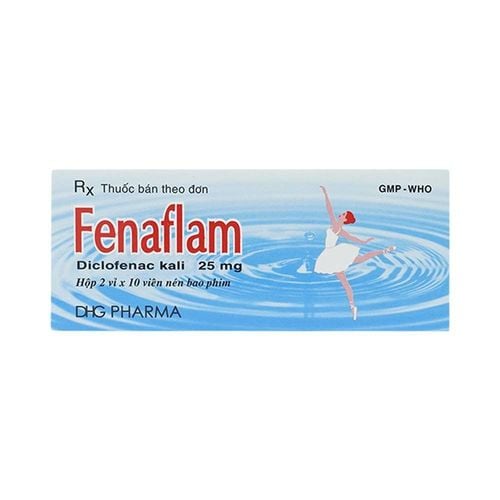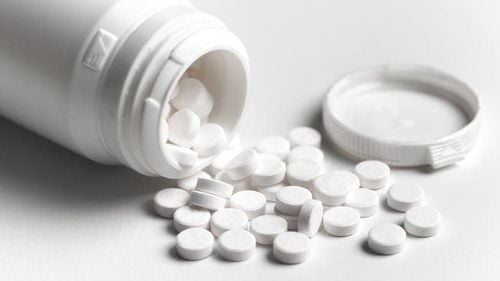This is an automatically translated article.
Extraprin is usually packaged in the form of tablets with many different dosages. Extraprin has a combination of ingredients such as acetaminophen, aspirin and caffeine... to provide the main effect of pain relief. This is an over-the-counter (OTC) medication, but sometimes doctors prescribe it to a patient if appropriate.
1. What is Extraprin and what does it do?
Extraprin is a combination product of aspirin, acetaminophen and caffeine. The drug is used for temporary relief of pain caused by conditions such as:
Muscle aches; Toothache; Dysmenorrhea ; Headache, migraine. While aspirin and acetaminophen help relieve pain by preventing the body from making certain natural chemicals, caffeine can increase the effects of aspirin and acetaminophen.
2. How to use Extraprin
If you are using over-the-counter Extraprin to treat yourself at home, read all directions on the product packaging before taking it. Consult a pharmacist if in doubt. If your doctor prescribes Extraprin, you need to take it exactly as directed.
Extraprin is a common oral medication. Drink a full glass of water (8 ounces or 240ml) with the medicine unless your doctor directs you otherwise. If you are taking Extraprin tablets, do not lie down for at least 10 minutes after taking them. People with colic can take the medicine with food or milk.
Dosage of Extraprin is based on each person's medical condition, as well as their ability to respond to treatment. Do not increase your dose or use it more often or for longer than directed. Do not use this product if pain persists for more than 10 days or fever persists for more than 3 days. Only a small dose should be used to be effective.
For people who take Extraprin only when needed (not on a regular schedule) it should be noted that pain relievers work best when the first signs of pain occur. If you wait until the pain is worse to take your medicine, Extraprin may not work anymore.
For those who are taking Extraprin products to treat headaches, they should seek medical attention immediately if they have any of the following symptoms:
Difficulty speaking; Weakness on one side of the body; Sudden vision changes. Consult your doctor or pharmacist before using Extraprin if you suffer from:
Daily headaches; Only had headaches since the age of 50; Headaches that are more severe or different from regular headaches; Headache due to trauma to this area; Cough or emphysema/decompression sickness; Headache accompanied by persistent/severe vomiting, fever, and stiff neck. Consult your doctor or pharmacist if your migraine does not improve or gets worse after the first dose.
If you are using migraine medicine for 10 days or more per month, the headache may be aggravated by drug abuse. So tell your doctor if:
You need to use Extraprin more often; The drug does not work effectively; The headache gets worse. Consult your doctor if your condition persists or worsens after taking Extraprin, for example:
New or unusual symptoms appear; Redness or swelling of the painful area; Pain/fever that persists or gets worse.

Liều lượng dùng Extraprin dựa trên tình trạng sức khỏe của mỗi người, cũng như khả năng đáp ứng với điều trị
3. Side effects when taking Extraprin
Some potential side effects that may occur when taking Extraprin include:
Nausea; Vomiting; Stomach upset; Difficulty falling asleep; Feeling shaky/anxious. Inform your doctor/pharmacist immediately if you experience any of the above symptoms persist or worsen. In fact, before the patient was instructed to use Extraprin, the doctor assessed that the risk of side effects was negligible compared to the benefit. Many people still use Extraprin safely without any serious side effects.
Stop taking the medicine and tell your doctor right away if you experience the following serious side effects of Extraprin:
Severe dizziness; Faint ; Persistent or worsening stomach pain; Vomiting, vomit that looks like coffee grounds; Black or bloody stools; Tinnitus ; Hearing loss; fast or irregular heartbeat; signs of kidney problems (eg, change in the amount of urine); Signs of infection (eg: persistent fever or sore throat); Easy bruising/bleeding. It is very unlikely that a serious allergic reaction - such as rash, itching/swelling, dizziness, trouble breathing - will occur with Extraprin, but seek immediate medical attention if one occurs. If you notice other effects of Extraprin medicine, other than those listed above, contact your doctor/pharmacist for advice.
4. Caution when taking Extraprin
Before taking Extraprin, tell your doctor or pharmacist if you are allergic to:
Extraprin; Aspirin; other NSAIDs such as ibuprofen , naproxen , or celecoxib ; Other salicylates, eg choline salicylates; Acetaminophen; Caffeine; This product should not be used if you have aspirin-sensitive asthma, as people with this condition often have a history of worsening breathing with a runny/congested nose after taking aspirin or other NSAIDs (such as ibuprofen, naproxen).
To use Extraprin safely, you need to tell your doctor or pharmacist your medical history in advance, especially:
Asthma; Certain blood disorders such as anemia; Bleeding or blood clotting problems (or bleeding, low platelet count); Ulcers; Gout ; Diabetes; Kidney disease ; Liver failure; Development of nasal polyps; Anxiety disorders ; Insomnia ; Heart disease (eg, arrhythmia); High Blood Pressure; Stomach problems (for example, heartburn, upset stomach, or upset stomach). Before having surgery or certain medical procedures (including a stress test or the procedure to restore a normal heart rhythm for someone with an abnormally fast heart rate), tell your healthcare provider if you Use Extraprin as well as all other medicines (if any).
Extraprin can cause stomach bleeding, especially in people who use alcohol and tobacco every day. Therefore, it is advisable to avoid alcohol and stop smoking. Older adults may be more sensitive to the side effects of Extraprin , especially:
Bleeding; Stomach/intestinal ulcers; liver problems; Difficulty sleeping. Children and adolescents under 18 years of age should not use aspirin, aspirin-containing medicines, or aspirin-related drugs to treat flu or chickenpox symptoms without consulting their doctor first. Abuse of aspirin in children can cause Reye's syndrome, a rare but serious illness. Tell your doctor right away if you notice a change in your child's behavior, accompanied by nausea and vomiting.
Before using Extraprin, women of childbearing age should talk to their healthcare provider about the benefits and risks. Tell your doctor if you are pregnant or planning to become pregnant as this medicine may harm an unborn baby and cause problems during labor/birth. Extraprin is also not recommended for use from 20 weeks of pregnancy until delivery. If your doctor decides that you need to use Extraprin between 20 and 30 weeks of pregnancy, you should take only the lowest dose to achieve the shortest effect. Pregnant women should not use Extraprin after 30 weeks of pregnancy.
This product will pass into breast milk and may cause unwanted effects on the infant. So before breastfeeding you need to consult your doctor.
5. Interaction between Extraprin and other drugs
If you have been directed to take this medication, your doctor or pharmacist may already be aware of the potential for drug interactions and is still being monitored. Therefore, you should not start, stop or change the dose of any medicine without first checking with your doctor or pharmacist.
To avoid very serious interactions, Extraprin should not be used with drugs such as ketorolac and mifepristone. If you are currently taking these two medicines, tell your healthcare provider before you start using Extraprin.
In addition, before prescribing Extraprin, your doctor or pharmacist should also know about all prescription and over-the-counter products you use, especially:
Acetazolamide ; Cimetidine; Corticosteroids (eg, prednisone); Dichlorphenamide; Ketoconazole ; Methotrexate; certain gout medicines (eg, probenecid, sulfinpyrazone); Anticonvulsants (eg, phenytoin, valproic acid); Vemurafenib. Consult your doctor before using this product if you have recently received certain strains of live vaccines, e.g. Chickenpox vaccine, flu vaccine....
Medicine Extraprin may increase the risk of bleeding when taken with other medicines such as: Antiplatelet drugs (clopidogrel); Blood thinners (dabigatran/enoxaparin/warfarin)....
Before taking Extraprin, double-check all prescription and OTC labels to see if they contain pain-reducing/fever-reducing ingredients (acetaminophen, aspirin or ibuprofen, celecoxib, naproxen) or not. If Extraprin is taken with these products, the risk of side effects may be increased. However, for people who have been instructed by their doctor to prevent heart attack or stroke with low-dose aspirin (usually around 81 to 325 milligrams per day), they should continue to follow their doctor's instructions.
Extraprin may also affect certain tests (eg, urinary tract tests, dipyridamole-thallium imaging tests). So you need to tell laboratory staff and doctors if you are taking Extraprin .

Thuốc Extraprin có thể làm tăng nguy cơ chảy máu khi dùng chung với các loại thuốc khác
6. Other notes when using Extraprin
6.1. Overdose Call 911 immediately if you have overdosed on Extraprin and have severe symptoms such as difficulty breathing or passing out. Signs of an overdose usually include:
Nausea, vomiting; Anorexia; Sweat; Burning pain in the throat and stomach; Stomach/abdominal pain; Extreme fatigue; Yellow eyes/skin; Tinnitus ; Rapid/shallow breathing; fast or irregular heartbeat; Change in the amount of urine; Dark urine; Confusion; agitation; Convulsions; Loss of consciousness. 6.2. Missed dose For people who have to take Extraprin regularly and forget a dose, take it as soon as you remember. However, if it is almost time for your next dose, you can skip the missed dose. Continue your usual dosing schedule and do not need to double the dose.
6.3. Storage Store Extraprin at room temperature between 59 - 86 degrees F (15 - 30 degrees C), away from light and moisture, out of reach of children and pets. Do not store in the bathroom. Dispose of the product in the appropriate manner when it has expired or is no longer needed.
6.4. Note Do not share Extraprin with others. If you use Extraprin regularly for a long time or in high doses, liver and kidney function tests should be performed to monitor for side effects.
Because Extraprin contains caffeine, taking it near bedtime can make it difficult to fall asleep. Limit the use of other drugs, foods, or beverages that also contain caffeine while taking this product. If you take too much caffeine, you may become anxious or irritable, have trouble sleeping, or have a fast heartbeat.
If you are taking Extraprin for a headache, it is best to also avoid certain foods that can cause headaches. Lifestyle changes by reducing stress, exercise, and dietary changes can help prevent headaches.
Please dial HOTLINE for more information or register for an appointment HERE. Download MyVinmec app to make appointments faster and to manage your bookings easily.
Reference source: webmd.com












